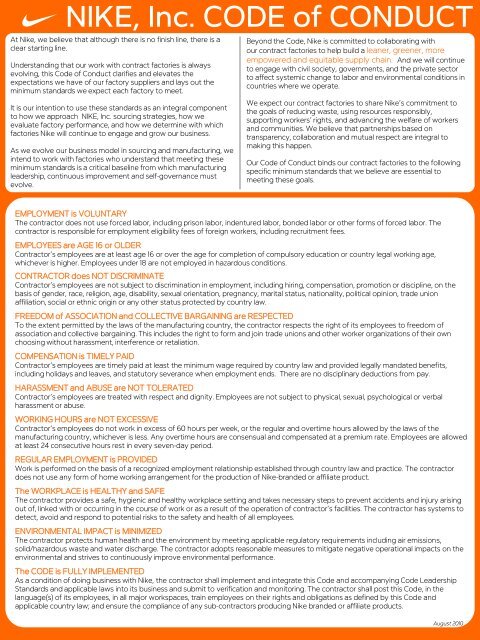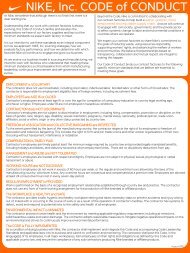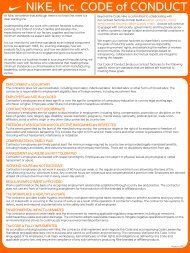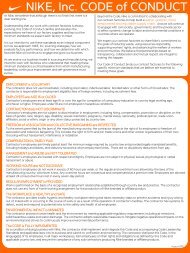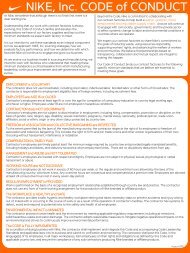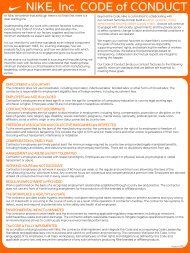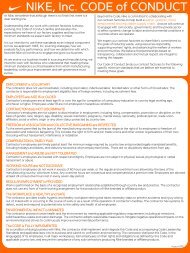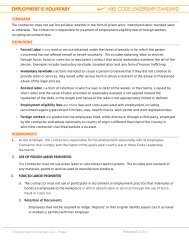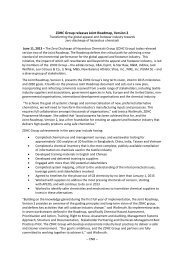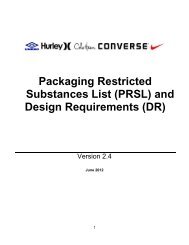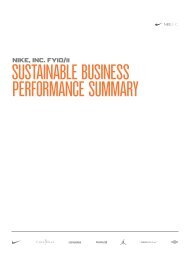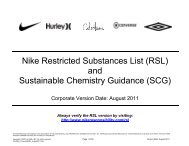COC CLS - Regular Employment - NIKE, Inc. - The Journey
COC CLS - Regular Employment - NIKE, Inc. - The Journey
COC CLS - Regular Employment - NIKE, Inc. - The Journey
Create successful ePaper yourself
Turn your PDF publications into a flip-book with our unique Google optimized e-Paper software.
S <strong>NIKE</strong>, <strong>Inc</strong>. CODE of CONDUCT<br />
At Nike, we believe that although there is no finish line, there is a<br />
clear starting line.<br />
Understanding that our work with contract factories is always<br />
evolving, this Code of Conduct clarifies and elevates the<br />
expectations we have of our factory suppliers and lays out the<br />
minimum standards we expect each factory to meet.<br />
It is our intention to use these standards as an integral component<br />
to how we approach <strong>NIKE</strong>, <strong>Inc</strong>. sourcing strategies, how we<br />
evaluate factory performance, and how we determine with which<br />
factories Nike will continue to engage and grow our business.<br />
As we evolve our business model in sourcing and manufacturing, we<br />
intend to work with factories who understand that meeting these<br />
minimum standards is a critical baseline from which manufacturing<br />
leadership, continuous improvement and self-governance must<br />
evolve.<br />
Beyond the Code, Nike is committed to collaborating with<br />
our contract factories to help build a leaner, greener, more<br />
empowered and equitable supply chain. And we will continue<br />
to engage with civil society, governments, and the private sector<br />
to affect systemic change to labor and environmental conditions in<br />
countries where we operate.<br />
We expect our contract factories to share Nike’s commitment to<br />
the goals of reducing waste, using resources responsibly,<br />
supporting workers’ rights, and advancing the welfare of workers<br />
and communities. We believe that partnerships based on<br />
transparency, collaboration and mutual respect are integral to<br />
making this happen.<br />
Our Code of Conduct binds our contract factories to the following<br />
specific minimum standards that we believe are essential to<br />
meeting these goals.<br />
EMPLOYMENT is VOLUNTARY<br />
<strong>The</strong> contractor does not use forced labor, including prison labor, indentured labor, bonded labor or other forms of forced labor. <strong>The</strong><br />
contractor is responsible for employment eligibility fees of foreign workers, including recruitment fees.<br />
EMPLOYEES are AGE 16 or OLDER<br />
Contractor’s employees are at least age 16 or over the age for completion of compulsory education or country legal working age,<br />
whichever is higher. Employees under 18 are not employed in hazardous conditions.<br />
CONTRACTOR does NOT DISCRIMINATE<br />
Contractor’s employees are not subject to discrimination in employment, including hiring, compensation, promotion or discipline, on the<br />
basis of gender, race, religion, age, disability, sexual orientation, pregnancy, marital status, nationality, political opinion, trade union<br />
affiliation, social or ethnic origin or any other status protected by country law.<br />
FREEDOM of ASSOCIATION and COLLECTIVE BARGAINING are RESPECTED<br />
To the extent permitted by the laws of the manufacturing country, the contractor respects the right of its employees to freedom of<br />
association and collective bargaining. This includes the right to form and join trade unions and other worker organizations of their own<br />
choosing without harassment, interference or retaliation.<br />
COMPENSATION is TIMELY PAID<br />
Contractor’s employees are timely paid at least the minimum wage required by country law and provided legally mandated benefits,<br />
including holidays and leaves, and statutory severance when employment ends. <strong>The</strong>re are no disciplinary deductions from pay.<br />
HARASSMENT and ABUSE are NOT TOLERATED<br />
Contractor’s employees are treated with respect and dignity. Employees are not subject to physical, sexual, psychological or verbal<br />
harassment or abuse.<br />
WORKING HOURS are NOT EXCESSIVE<br />
Contractor’s employees do not work in excess of 60 hours per week, or the regular and overtime hours allowed by the laws of the<br />
manufacturing country, whichever is less. Any overtime hours are consensual and compensated at a premium rate. Employees are allowed<br />
at least 24 consecutive hours rest in every seven-day period.<br />
REGULAR EMPLOYMENT is PROVIDED<br />
Work is performed on the basis of a recognized employment relationship established through country law and practice. <strong>The</strong> contractor<br />
does not use any form of home working arrangement for the production of Nike-branded or affiliate product.<br />
<strong>The</strong> WORKPLACE is HEALTHY and SAFE<br />
<strong>The</strong> contractor provides a safe, hygienic and healthy workplace setting and takes necessary steps to prevent accidents and injury arising<br />
out of, linked with or occurring in the course of work or as a result of the operation of contractor’s facilities. <strong>The</strong> contractor has systems to<br />
detect, avoid and respond to potential risks to the safety and health of all employees.<br />
ENVIRONMENTAL IMPACT is MINIMIZED<br />
<strong>The</strong> contractor protects human health and the environment by meeting applicable regulatory requirements including air emissions,<br />
solid/hazardous waste and water discharge. <strong>The</strong> contractor adopts reasonable measures to mitigate negative operational impacts on the<br />
environmental and strives to continuously improve environmental performance.<br />
<strong>The</strong> CODE is FULLY IMPLEMENTED<br />
As a condition of doing business with Nike, the contractor shall implement and integrate this Code and accompanying Code Leadership<br />
Standards and applicable laws into its business and submit to verification and monitoring. <strong>The</strong> contractor shall post this Code, in the<br />
language(s) of its employees, in all major workspaces, train employees on their rights and obligations as defined by this Code and<br />
applicable country law; and ensure the compliance of any sub-contractors producing Nike branded or affiliate products.<br />
August 2010
REGULAR EMPLOYMENT<br />
STANDARD<br />
Work is performed on the basis of a recognized employment relationship established through country law<br />
and practice. <strong>The</strong> Contractor does not use any form of homeworking arrangement for the production of<br />
Nike branded or Nike Affiliate product.<br />
DEFINITIONS<br />
• Short-term contract. In the absence of country law definition, short-term contracts are those of 1 year<br />
duration or less.<br />
• Temporary worker is a production line worker who works on the contractor’s premises, but who is<br />
provided and paid by a third-party, such as a temporary employment agency.<br />
• Widespread violations are those that are pervasive within the factory and/or represent a systemic<br />
failure that has adversely affected a large portion of employees.<br />
REQUIREMENTS<br />
1. As the employer, the contractor is responsible for the employment relationship with its employees.<br />
Contractor shall comply with the higher of the applicable country law or these Code Leadership<br />
Standards.<br />
2. REGISTRATION<br />
<strong>The</strong> contractor shall comply with the requirements of country law regarding registration of employees.<br />
3. CONTRACTS OF EMPLOYMENT<br />
a. <strong>The</strong> contractor shall comply with the requirements of country law regarding use of contracts of<br />
employment, including any requirement that employees have a written employment contract, as<br />
well as the terms, duration and/or renewal of such employment contracts.<br />
b. <strong>The</strong> contractor must fully explain the terms outlined in the employee’s employment contract, if any,<br />
which should be written in the employee’s language.<br />
c. Where employment contracts are used, employees should be given a copy of the employment<br />
contract in the employee’s language before entering employment.<br />
4. USE OF TEMPORARY WORKERS AND SHORT-TERM CONTRACTS<br />
a. <strong>The</strong> contractor should not avoid its obligations under labor or social security laws arising from the<br />
regular employment relationship through the excessive use of temporary (labor only contracting) or<br />
use of short or fixed-term contracts.<br />
b. Use of temporary employees, where legally permitted, to perform production work should to the<br />
extent possible only be used to meet seasonal work or peak season production or to fill short-term<br />
vacancies or staffing needs of less than one year.<br />
<strong>Regular</strong> <strong>Employment</strong> <strong>CLS</strong> – Page 1 03.15.10
REGULAR EMPLOYMENT<br />
c. Examples of possible excessive use of temporary production workers or short-term contracts include:<br />
i. Widespread use of temporary workers for more than one year to meet an ongoing employment<br />
need;<br />
ii.<br />
Widespread renewal of short-term contracts where such practice denies employees full<br />
entitlement to severance pay, social security tenure, etc.; and<br />
iii. Where more than 15% of production line workers are temporary workers or on short-term contract.<br />
d. <strong>Employment</strong> laws and practices in this area are complex and vary significantly from country-tocountry.<br />
Application of this Standard will be determined on a country-by-country basis.<br />
5. APPRENTICE PROGRAMS<br />
a. As a general rule, payment of “training wages” or participation in “apprenticeship programs” is not<br />
allowed where such programs result in the payment of wages or provision of employee benefits less<br />
than that provided to regular employees.<br />
b. As an exception, such programs may be approved on a case-by-case basis where the program is:<br />
i. Provided for and in compliance with country law;<br />
ii.<br />
Designed for the benefit of the trainees by imparting job skills or leading to regular employment;<br />
iii. <strong>The</strong> trainee’s participation in the program is limited in duration (generally no more than 6 months);<br />
iv. Trainees are compensated for production of any finished product at the legal minimum wage, or<br />
higher; and<br />
v. <strong>The</strong> program is not used for the purpose of avoiding the contractor’s obligations under labor or<br />
social security laws arising from the employment relationship.<br />
6. HOMEWORKING ARRANGEMENTS PROHIBITED<br />
a. To ensure compliance with the Code of Conduct and these Code Leadership Standards, the<br />
contractor shall not use any form of homeworking arrangement for the production of Nike branded<br />
or Nike Affiliate product. This means that employees shall not perform Nike branded or Nike Affiliate<br />
production work outside of the regular work place.<br />
b. Where home working arrangements are in place for other Buyers (non-Nike or non-Nike Affiliate<br />
production), the contractor must put in place and be able to demonstrate the system by which it is<br />
ensured that Nike branded and Nike Affiliate production is not deliberately or inadvertently home<br />
worked.<br />
Except where specifically identified as a recommended practice, this Code Leadership Standard sets minimum<br />
standards – contractors must comply with any applicable higher legal requirement and are encouraged to continue to<br />
develop their own practices which provide greater protection for their employees.<br />
<strong>Regular</strong> <strong>Employment</strong> <strong>CLS</strong> – Page 2 03.15.10


